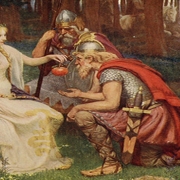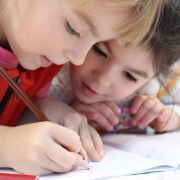The Classical Method
For generations up to the Industrial Revolution, children were educated according to the Trivium of the Classical method. This method was credited for creating such leaders as George Washington and philosophers such as Aristotle. It is hoped that every family can use this method to enhance their own educational methods!
What is the Classical Method?
In a nutshell, the Classical Method is the way children learn through their various stages of development. Instead of forcing a child to look at History logically in second grade, the Trivium teaches that a child in the second grade is when you teach the “grammar” of history or to say it another way, the trivium during second grade is concerned with teaching facts. It is a very simple method that yields terrific results.
What is the Trivium?
The trivium consists of the Grammar, Logic, and Rhetoric stages of development. The Poll Parrot Stage has been included in recent years. People from birth to adulthood have a certain pattern of learning, which is reflected in this Trivium.
Poll-Parrot
Has one ever noticed that toddlers love to hear the same story (especially rhyming ones) repeatedly? This is in essence what the “Poll Parrot” stage of learning is about. Preschoolers love to imitate and learn well through imitation, repetition, and memorization. This stage a parent should encourage memorization through imitation and repetition. Consider, for instance, a four-year-old and Dr. Seuss. The child has the parent read the stories over and over again, he/she then imitate the parent reading while reciting the story from memory. Parents feel that this is tedious, but the preschooler absolutely loves it and is, in fact, learning! This is also where the timeless phrase: “Garbage in, Garbage out” comes into play. The beauty of Classical Education is that its method takes into consideration this unique learning phase and chooses to capitalize on it by filling the child’s mind with language, music, art, history, etc… The parent can give the child a valuable beginning in education. This understanding of the young mind help prepare the parroting preschooler for the “only the facts” primary schooler.
Grammar
Usually what comes to mind when a one thinks of Grammar is nouns, verbs, sentence structure, etc… Actually it is the Grammar of life and education that the child is learning. First through Fourth grade is considered the Grammar Stage. Think of this stage as the facts stage. The child is learning the foundational facts that support all subjects. It is vital in this stage that the child learns the fundamentals of life: Reading, Writing, and Arithmetic, or the three R’s. Although science, history, art, music, etc… are also a part of education, they are given the backseat to the foundations of learning. It may again be tedious education, but the Grammar stage student loves the facts and wants to learn the facts of life. Just as a journalist has to gather all the facts to give a fair and balanced report on a subject, so to does the student need the grammar of subjects to later understand them. Finally, the Grammar Stage mind can in Fourth Grade start the study of Latin. Up until about 50 years ago in public schools, Latin was a required subject in High School. For whatever reason, now Latin only resides in the curriculum of choice private schools. Latin makes the Logical mind think more efficiently. The child is not learning a new language, but a more systematic, logical way to analyze information. Fourth grade is the gateway into the Logic Stage where the foundation of facts and beginning of logic based thinking prepares for the next stage: Logic Stage.
Logic
The Logic Stage is exactly as it sounds, about logic! This stage begins with Fifth and finishes with Eighth Grade. During this stage of development, the young mind can now take the facts that they have learned and start using the rules of logic to make deductions, answer questions, and dissect facts. The logical child now starts to question the facts that he or she has learned. For instance, why did the Egyptian Empire fade away? Why did the Egyptians build pyramids? This is a vast change from the Grammar stage where the child was merely taught: Who were the Egyptians? This is also the stage where formal logic is taught. Logic is about analysis of structure and validity of information. The skills of logical analysis build upon the foundation of facts learned in the Grammar Stage. Although the child is still in the elementary stages of analysis, again, the beauty of Classical Education is the systematic and methodical building of a completed K-12 education, so the child is being taught to think logically a piece at a time to further prepare them for his or her next developmental progression into the ability to create arguments based on facts and logic: The Rhetoric Stage.
Rhetoric
It is absurd to hold that a man should be ashamed of the inability to defend himself with his limbs, but not ashamed of an inability to defend himself with speech and reason; for the use of rational speech is more distinctive of a human being than the use of his limbs.
~Aristotle, Rhetoric
The young adult has been taught the facts of life, the logical way to interpret them, and now will be taught how to use the gift of speech to present them. Typically this stage starts in Ninth Grade and ends with Twelfth Grade. This is when the young adult will start research, analysis, and presentation of information. All subjects will encompass this process. This stage of young adults life is marked by self-expression. As many know, the teenager is all a bustle about expressing his or herself in anyway possible. Aristotle goes on to say:
“…all men attempt to discuss statements and to maintain them, to defend themselves and to attack others. Ordinary people do this either at random, or through practice and from acquired habit.”
(Wise-Bauer, p. 452)
The Rhetoric Stage strives “to make success in speech a matter of skill and practice, not accident.” (Wise-Bauer, p. 452) The Rhetoric student will use all the skills gained up to this point to further master the ability to present ideas, facts, and studies of all subjects. This stage is about the finished product of a long study. Instead of simply learning about Da Vinci, or why he did what he did, the Rhetoric student will read, discuss, debate and present a complete study of this historical figure. The Rhetoric Stage not only completes the Trivium, but also prepares the child/young adult for partaking the Great Conversation.
The Great Conversation is the understanding, analyzing, and understanding of ideas of the past that have created the world we live in now. The goals of our Folk should include having our children a part of the Great Conversation. Do we not want our children to have a keen understanding of history, philosophy, and mathematics then to also be able to communicate these ideas appropriately through oral and written communication? Classical education provides the means to awaken the intelligence that resides within our children already. Furthermore, the Classical method considers the natural way children learn: systematically, slowly, and thoroughly.
Personal Note
Our Family uses the Classical method via The Well Trained Mind by Jesse Wise and Susan Wise-Bauer. This Mother and Daughter teamed up to produce an excellent book that gives a combination of inspiration and step-by-step guide to Classical education. The above (very brief) overview of Classical education is result of our practical use of this method and understanding of those parts that are not yet used. We have found many positive results. For instance, the children are quickly grasping complex ideas and communicating them in their simple, yet rich, terms. It is fascinating to see that kind of understanding in an 8-year-old; or to simply be questioned (sometimes endlessly) about everything. Although we did have this to an extent, but there has been a marked improvement. One thing that we have experienced is the difficulty in finding material that was not heavily Christianized. This is wonderful for those of us that are Christians, but for those of us that are not, it is rather frustrating.
“Education is not the filling of a vessel, but the igniting of a flame!” ~ Socrates
Works Cited/ Reference:
Wise-Bauer, Susan and Wise, Jessie; 1999. The Well Trained Mind .W. W. Norton & Company; New York. ISBN: 0-393-04752-0



Leave a Reply
Want to join the discussion?Feel free to contribute!